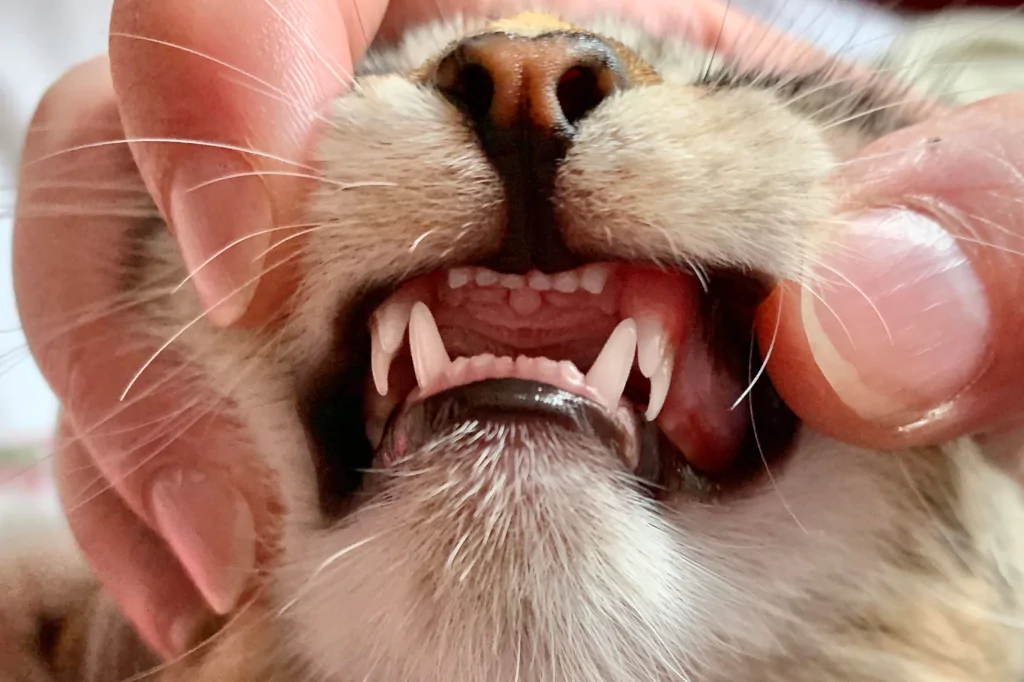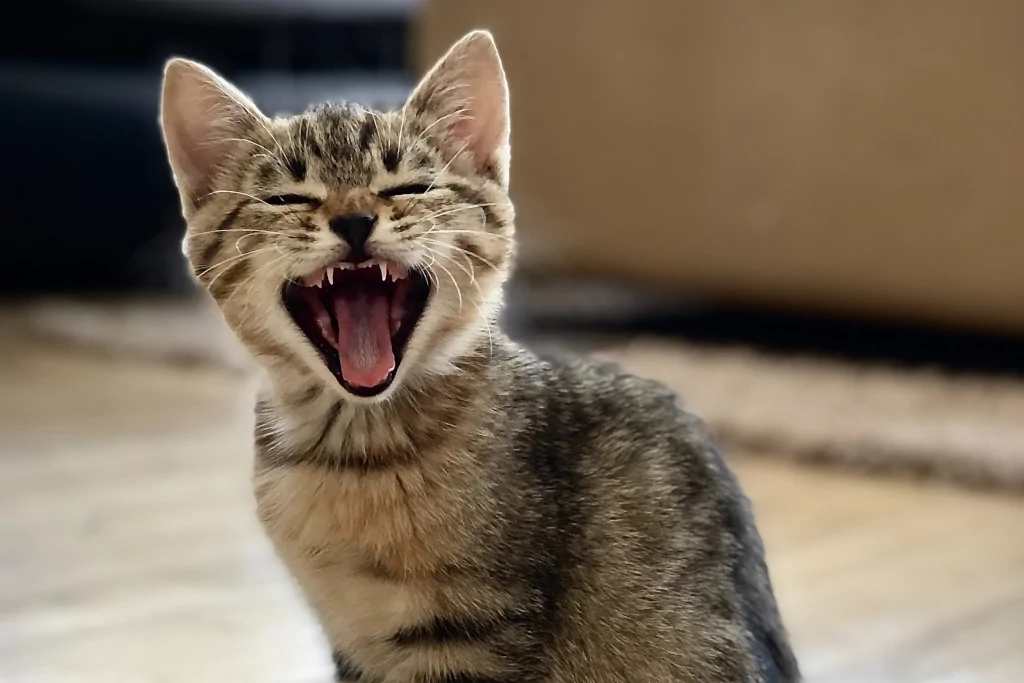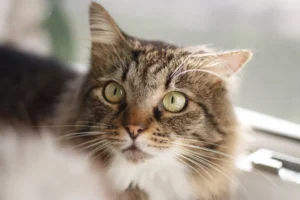Note: We may earn a commission from helpful, relevant links in our content. No cost to you. See our privacy policy.
Picture this: you’re cuddling with your furry friend, enjoying some quality bonding time, when suddenly, you’re hit with a whiff of bad breath. It’s more than just a passing annoyance – your cat’s dental health is at stake.
Just like humans, our feline companions need proper dental care to avoid serious health issues.
I remember the day I first noticed my cat’s breath was less than fresh. I had just returned home from work, and as she greeted me with a meow, I couldn’t help but notice her not-so-pleasant breath. That day, I realized the importance of feline dental health and became proactive about it.
Let’s delve into the world of cat dental care, so you can avoid the same surprise I had and ensure your feline friend stays healthy and happy.

Why Is Good Dental Health Important for Cats?
Good dental health is essential for cats because it impacts their overall well-being.
Healthy teeth and gums are necessary for proper eating and maintaining a balanced diet, ensuring your cat gets the necessary nutrients for a healthy life.
Additionally, good oral hygiene helps prevent dental diseases, which can lead to other health complications such as infections, tooth loss, and even organ damage if left untreated. By prioritizing your cat’s dental health, you’re setting them up for a healthier, more comfortable life.
The Dangers of Neglecting Your Cat’s Oral Health
Neglecting your cat’s oral health can have serious consequences.
Dental problems like gingivitis, periodontal disease, and tooth resorption are common in cats, and if left untreated, they can lead to pain, tooth loss, and even life-threatening infections.
Moreover, poor dental health can negatively affect your cat’s overall well-being, as bacteria from dental diseases can enter the bloodstream and cause damage to vital organs such as the heart, liver, and kidneys.
Don’t let your cat suffer in silence – prioritize their dental health to prevent these issues and ensure a better quality of life.
How Can You Maintain Your Cat’s Dental Health?
With a few practical measures and consistent efforts, you can keep your feline friend’s teeth and gums healthy. Here are some key strategies to help you maintain your cat’s dental health.
Tooth Brushing Techniques and Frequency
Brushing your cat’s teeth might sound daunting, but it’s an essential part of keeping their oral health in check.
Start by introducing the toothbrush gradually, allowing your cat to sniff and get familiar with it.
Use a specially designed cat toothbrush or a soft-bristled children’s toothbrush, along with cat-safe toothpaste. Human toothpaste contains ingredients that can be toxic to cats, so avoid using it.
Aim to brush your cat’s teeth at least a few times a week. Gently lift their lips to expose their teeth, and brush in small circular motions, focusing on the gum line. Here’s more info on how to brush your cat’s teeth.
I remember when I first started brushing my cat’s teeth, she was less than enthusiastic. But with patience, rewards, and positive reinforcement, she eventually accepted the routine. Remember, patience and consistency are key when introducing a new habit.
Recommended Cat Toothpastes
Taking care of your cat’s teeth is made easier with the right toothpaste. We’ve researched and handpicked some of the best options on the market, specifically designed for feline dental care. These toothpastes not only help clean your cat’s teeth and gums but also come in flavors that your furry friend will love:
- Virbac C.E.T. Enzymatic Toothpaste. This poultry-flavored toothpaste is designed for cats and dogs and contains enzymes to help reduce plaque and tartar.
- Sentry Petrodex Enzymatic Toothpaste for Cats. This malt-flavored toothpaste is formulated specifically for cats and helps control plaque and bad breath.
- Nylabone Advanced Oral Care Cat Toothpaste. Designed to help reduce plaque and tartar buildup, the toothpaste features a fish flavor that appeals to most cats.
Recommended Cat Toothbrushes
When choosing a toothbrush for your cat, look for a soft-bristled brush or a finger brush specifically designed for cats. These brushes will help make the brushing process more comfortable and effective for your furry friend.
To help you make an informed choice, we’ve selected some top-rated cat toothbrushes that will make maintaining your furry friend’s oral hygiene a breeze:
- Soft Cat Toothbrush with 360-degree Head. This unique design allows for a more thorough cleaning and makes it easier to reach all areas of your cat’s mouth.
- Virbac C.E.T. Pet Toothbrush. Designed with a long handle and soft bristles, this toothbrush is perfect for gently cleaning your cat’s teeth and gums.
- H&H Pets Cat Finger Toothbrush. Made of soft silicone, this finger toothbrush is a great option for cats who are new to the brushing routine and allows for better control during brushing.

Recommended Dental Treats and Chews
Dental treats and chews can be a helpful addition to your cat’s dental care routine. These products are designed to help reduce plaque and tartar build-up while stimulating their gums.
Look for treats with the Veterinary Oral Health Council (VOHC) seal, which indicates that the product meets specific dental health standards.
To make your cat’s dental care routine even more effective, we’ve compiled a list of some top-quality dental treats and products that have been awarded the VOHC seal. These products have met specific dental health standards, ensuring that they are both safe and beneficial for your cat’s oral health:
- Feline Greenies® Feline Dental Treats (Consumer, awarded in 2005): These edible treats are designed to help reduce tartar buildup and are available in various flavors to entice your cat.
- Purina DentaLife Daily Oral Care Cat Treats (Consumer, awarded in 2016): These edible treats come in two flavors and are formulated to help reduce tartar buildup while providing a tasty snack for your cat.
- Purina Pro Plan Veterinary Diets Crunchy Bites Feline Treats (awarded in 2019): These edible treats are designed to help reduce plaque and tartar buildup in your cat’s mouth.
While dental treats and chews can support your cat’s oral hygiene, they shouldn’t replace regular tooth brushing and veterinary check-ups.
Regular Veterinary Dental Check-Ups
Cat dental problems are actually a common issue in cats. Therefore, routine dental check-ups are essential in maintaining your cat’s oral health. Your veterinarian will be able to identify any early signs of dental issues and recommend appropriate treatments.
Schedule a dental exam for your cat at least once a year, or more frequently if your veterinarian recommends it based on your cat’s needs.
In addition to these core strategies, you can also consider providing dental toys and water additives to further support your cat’s oral health.
Always consult with your veterinarian before introducing new products or routines to ensure they’re safe and suitable for your cat’s specific needs. By incorporating these practical steps into your cat’s dental care regimen, you’ll be setting them up for a lifetime of healthy teeth and gums.
How to Recognize Signs of Dental Problems in Your Cat?
Cats are masters at hiding pain, but certain signs can indicate dental problems. Be on the lookout for:
- Bad breath
- Drooling
- Difficulty eating or chewing
- Pawing at the mouth
- Swollen or bleeding gums
- Loose or discolored teeth
- Weight loss due to difficulty eating
I remember when my cat suddenly became less interested in her favorite treats. Upon closer inspection, I noticed her gums were red and swollen. This prompted a visit to the vet, where we discovered she had a mild gum infection that required treatment.
So keep an eye on these signs because detecting dental issues in your cat early can make a significant difference in their oral health.
When To Seek Veterinary Care For Your Cat’s Dental Issues?
It’s crucial to seek veterinary care for your cat’s dental issues as soon as you notice any signs of a problem. Prompt treatment can prevent complications and protect your cat’s overall health.
For example, if your cat is exhibiting bad breath, difficulty eating, or swollen gums, it’s essential to consult your veterinarian. Early intervention can make treatment more manageable and less invasive for your furry friend.
If you haven’t yet found the right veterinarian, or you’re looking for second opinion, visit our guide on how to find the perfect vet for your cat. It’s simple, easy-to-follow, and helpful.
Here’s a great video on how to aproach brushing your cat’s teeth, step by step:
FAQs
What is the best type of toothpaste for cats?
The best type of toothpaste for cats is one specifically formulated for felines, free of fluoride and xylitol, which can be toxic to cats. Look for enzymatic toothpaste with a flavor your cat enjoys, such as poultry or fish.
How can I make toothbrushing more enjoyable for my cat?
To make tooth brushing more enjoyable for your cat, start slowly, use a tasty cat-safe toothpaste, and reward them with praise and treats during and after the process. Gradually increase the duration and frequency of brushing to help your cat acclimate to the routine.
Do dental diets really work for cats?
Dental diets can be beneficial for cats as they are designed to reduce plaque and tartar build-up. However, they should be used in conjunction with regular tooth brushing and veterinary dental check-ups for optimal oral health.
Are there any signs that my cat is in pain due to dental issues?
Signs that your cat may be in pain due to dental issues include difficulty eating, pawing at the mouth, drooling, bad breath, and changes in behavior, such as irritability or hiding. If you suspect your cat is experiencing dental pain, consult your veterinarian promptly.
Alex, a passionate animal lover, has experience in training and understanding animal behavior. As a proud pet parent to two dogs and three cats, he founded AnimalReport.net to share insights from animal experts and expand his knowledge of the animal kingdom.









